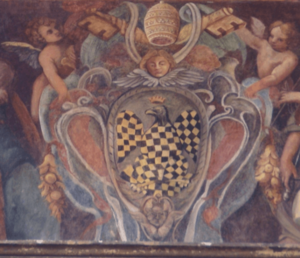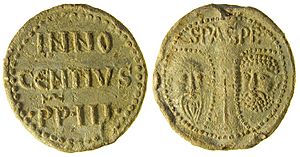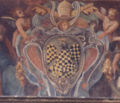Pope Innocent III facts for kids
Quick facts for kids Pope Innocent III |
|
|---|---|
| Bishop of Rome | |
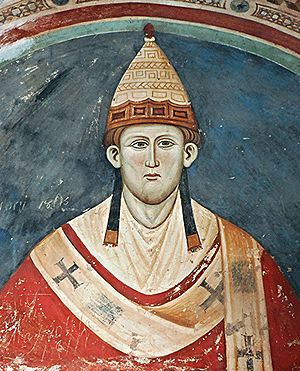
Detail of a fresco at the cloister Sacro Speco, c. 1219
|
|
| Church | Catholic Church |
| Papacy began | 8 January 1198 |
| Papacy ended | 16 July 1216 |
| Predecessor | Celestine III |
| Successor | Honorius III |
| Orders | |
| Ordination | 21 February 1198 |
| Consecration | 22 February 1198 by Ottaviano di Paoli |
| Created Cardinal | September 1190 |
| Personal details | |
| Birth name | Lotario de' Conti di Segni |
| Born | 22 February 1161 Gavignano, Papal States |
| Died | 16 July 1216 (aged 55) Perugia, Papal States |
| Nationality | Italian |
| Parents | Count Trasimund of Segni and Claricia Scotti |
| Previous post |
|
| Other Popes named Innocent | |
Pope Innocent III (born Lotario dei Conti di Segni) was the leader of the Catholic Church and the ruler of the Papal States from January 8, 1198, until his death on July 16, 1216. He was born on February 22, 1161.
Pope Innocent III was one of the most powerful and important popes during the Middle Ages. He had a great influence over the Christian countries of Europe. He believed the pope should have power over all kings. He helped reform the Church through his new rules and the Fourth Lateran Council. This greatly improved canon law, which is the Church's own set of laws. He also used strong measures, like banning religious services in a region (called an interdict), to make princes follow his decisions.
Innocent III also greatly expanded the Crusades, which were religious wars. He sent crusades to Muslim Spain and the Holy Land. He also launched the Albigensian Crusade against a group called the Cathars in southern France. He organized the Fourth Crusade (1202–1204), which ended with the sack of Constantinople. Even though he did not want Constantinople to be attacked, he accepted the outcome. He saw it as God's will to reunite the Latin and Eastern Orthodox Churches. However, this attack actually made the relationship between the two churches worse.
Contents
Biography of Innocent III
Early Life and Education
Lotario de' Conti was born in Gavignano, Italy, near Anagni. His father, Count Trasimondo of Segni, came from a famous family called the Conti di Segni. This family produced nine popes, including Gregory IX and Alexander IV. Lotario was also the nephew of Pope Clement III. His mother, Clarissa Scotti, was from a noble Roman family.
Lotario received his early education in Rome. He likely studied at the Benedictine abbey of St Andrea al Celio. He then studied theology in Paris and possibly law in Bologna. As pope, Lotario would later play a big role in shaping Church law.
After Pope Alexander III died in 1181, Lotario returned to Rome. He held various Church jobs under different popes. He became a Cardinal-Priest in 1191. As a cardinal, Lotario wrote a famous book called De miseria humanae conditionis (On the Misery of the Human Condition). This book was very popular for many centuries.
Becoming Pope
Pope Celestine III died on January 8, 1198. On the very same day, Lotario de' Conti was chosen as the new pope. He was elected after only two votes. He was only thirty-seven years old at the time. He chose the name Innocent III. This name might have been a nod to Pope Innocent II, who had successfully shown the pope's power over the emperor.
Strengthening Papal Power
As pope, Innocent III believed he had great responsibility and authority. During his time as pope, the papacy (the pope's office) was at its strongest. He was seen as the most powerful person in Europe. In 1198, Innocent wrote about the idea that the pope's power was like the sun, and a king's power was like the moon. This meant the pope's spiritual power was greater than a king's worldly power. He made sure the Church's spiritual authority was absolute, while still respecting the power of kings.
Innocent III showed the pope's power in almost every country in Europe. For example, he excommunicated Alfonso IX of León for marrying a close relative against Church law. He also ended the marriage of Afonso II of Portugal for similar reasons. He even crowned Peter II of Aragon as king in Rome in 1204, after Peter agreed to be a vassal (a ruler who owes loyalty) to the pope.
The recapture of Jerusalem by Muslims in 1187 made Innocent believe it was a punishment for Christian leaders' mistakes. He also wanted to protect the "liberty of the Church" from kings. This meant kings should not choose bishops. He especially focused on the "patrimonium", which was the land in central Italy claimed by the popes. This land later became known as the Papal States. German kings often threatened these lands.
When Henry VI, Holy Roman Emperor died, his son Frederick II, Holy Roman Emperor was only three years old. Henry's wife, Constance, Queen of Sicily, ruled Sicily for her young son. She wanted to remove German power from Sicily, just like Innocent III. Before she died in 1198, she named Innocent as guardian of young Frederick. In return, Innocent got back Church rights in Sicily that had been given up earlier. The Pope made Frederick II King of Sicily in November 1198.
Involvement in Imperial Elections
Innocent was worried that the marriage of Henry VI and Constance of Sicily would give the German rulers control over all of Italy except the Papal States. This would leave the Papal States surrounded.
After Emperor Henry VI died, there was a fight over who would be the next Holy Roman Emperor. Henry's brother, Philip of Swabia, was chosen by some princes. Others chose Otto IV, Holy Roman Emperor, from a different family. Innocent openly supported Otto IV in 1201.
The confusion in the Empire allowed Innocent to remove German lords from areas like Ancona and Perugia. These lords had been put there by Emperor Henry VI. In 1201, the pope's representative announced that Otto IV was approved by the pope as the Roman king. He threatened to excommunicate anyone who did not accept him. Innocent also encouraged cities in Tuscany to form a league against German interests in Italy.
In 1202, Innocent issued a decree called Venerabilem. In this decree, he explained his ideas about the relationship between the pope and the Empire:
- German princes could elect the king, who would later become emperor. This right was given to them by the pope.
- The pope had the right to check if the elected king was worthy of being emperor. This was because the pope had to crown him.
- If the pope found the king unworthy, the princes had to elect a new one. If they refused, the pope would choose someone else.
- If two kings were elected, the pope would ask the princes to agree. If they couldn't, the pope would decide which one would be emperor.
Even with the pope's support, Otto could not defeat Philip until Philip was murdered. Once Otto was the undisputed ruler, he broke his promises. He tried to take back Imperial power in Italy and even Sicily. Since the pope wanted Germany and Sicily to remain separate, Innocent then supported his ward, King Frederick of Sicily. Frederick was elected by Philip's supporters.
The conflict was decided at the Battle of Bouvines in 1214. Otto was defeated by the French king. He lost all his power and died in 1218, leaving Frederick II as the undisputed emperor. Meanwhile, King John was forced to accept the Pope as his feudal lord. Frederick II, however, would later become a strong opponent of the papacy.
Crusades and Fighting Heresy
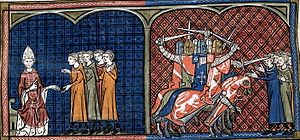
Pope Innocent III was also very dedicated to protecting the Catholic faith and fighting against heresy (beliefs that go against Church teachings). He focused mainly on the Albigenses, who were a large and active group in southern France. They were not just following heretical ideas but were also trying to spread them by force.
Innocent first sent monks to preach to the Albigenses and debate with them. But the Albigenses made fun of these missionaries. When a papal representative was murdered in 1208, Innocent decided to use force. He ordered bishops to ban religious services in towns that helped the murderers. He was especially angry at Raymond VI, Count of Toulouse, whom he suspected of planning the murder. The count said he was innocent, but the pope did not trust him.
Innocent called on the King of France, Philip II, to raise an army to fight the Albigenses. A harsh campaign followed, led by Simon of Montfort. This soon turned into a war of conquest. During the siege of Béziers, a crusader leader famously said, "Slay them all, God will recognize his own."
The Albigensian Crusade led to the deaths of many people, both Cathar and Catholic. It greatly reduced the number of Cathars and changed the region's culture. The conflict also became political, targeting not just heretics but also nobles. It eventually brought the region under the control of the French king. The conflict mostly ended with the Treaty of Paris of 1229.
Pope Innocent III spent much of his time as pope preparing for a big crusade to the Holy Land. His first attempt was the Fourth Crusade (1202–1204), which he announced in 1198. Unlike past popes, Innocent III wanted to lead the crusade himself.
To start the crusade, Innocent III sent missionaries to every Catholic country. He sent Peter of Capua to the kings of France and England. He told them to make peace, which led to a five-year truce between the two nations. The truce was meant to free up their resources for the Crusade. Innocent asked knights and nobles to lead the army. Many French lords answered his call, including Theobald of Champagne and Boniface. However, there was less enthusiasm in England or Germany.
The Fourth Crusade was very expensive. Innocent III decided to raise money by requiring all clergy (Church officials) to donate a small part of their income. This was the first time a pope had directly taxed the clergy. He also said that those who had promised to go on the crusade but could not, could pay money instead.
At first, the crusade was supposed to go to Egypt. The French Crusaders made a deal with the Venetians to supply ships and supplies. In return, the crusaders would pay a large sum of money. Innocent approved this deal with two conditions: a pope's representative must go with the crusade, and attacking other Christians was strictly forbidden. The French could not raise enough money. So, the Crusaders went to the Christian city of Zadar to get money from the Venetians.
This change of plans happened without Innocent III's approval. He threatened to excommunicate anyone who attacked Zadar. Most of the French ignored him and attacked Zadar. Innocent III excommunicated them, but then forgave them so they could continue the crusade. Then, the crusaders decided to conquer Constantinople, the capital of the Byzantine Empire. This was done at the request of an exiled Byzantine prince. Innocent III did not know about this until after the city was captured.
Innocent III was strongly against the attack on Constantinople. He sent many letters warning the crusaders not to sack the city. He excommunicated the crusaders who attacked Byzantine cities. However, he could not stop their actions. The attack on Constantinople led to the start of the Latin Empire's rule of Constantinople, which lasted for sixty years.
Francis of Assisi and New Orders
In 1209, Francis of Assisi and his first eleven followers went to Rome. They wanted permission from Pope Innocent III to start a new religious order. A cardinal who was close to the pope helped Francis. After some thought, Pope Innocent agreed to meet Francis. He later decided to support Francis's order. This happened around April 16, 1210, and officially started the Franciscan Order. The group, called the "Lesser Brothers," preached and owned nothing.
Pope Innocent III also approved other religious orders:
- The Hospitallers of the Holy Ghost in 1198.
- The Trinitarians in 1198.
- The Humiliati in 1201.
Fourth Lateran Council
On November 15, 1215, Pope Innocent III called the Fourth Lateran Council. This was considered the most important Church council of the Middle Ages. It issued seventy new rules. Among other things, it encouraged creating schools and holding clergy to higher standards. It also banned the practice of judicial ordeal.
The council also defined important Church beliefs. It reviewed the nature of the Holy Eucharist, required yearly confession of sins, and set rules for electing bishops. The council also demanded a strict lifestyle for clergy. It stated that Jews and Muslims should wear special clothing to be easily recognized. It also said that Jews should not hold public office over Christians.
Death and Legacy
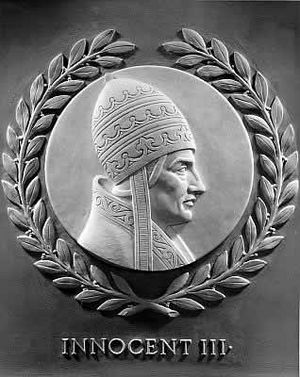
The Council had planned for the Fifth Crusade to begin in 1217. After the Council, in the spring of 1216, Innocent traveled to northern Italy. He wanted to make peace between the cities of Pisa and Genoa. He died suddenly in Perugia on July 16, 1216. He was buried in the cathedral of Perugia. Later, in 1891, Pope Leo XIII had his body moved to the Lateran in Rome.
Innocent III is one of two popes honored in marble relief portraits in the U.S. House of Representatives. This is to recognize their influence on the development of American law.
Works by Innocent III
His Latin writings include De miseria humanae conditionis, which is about living a simple, strict life. He wrote this before he became pope. He also wrote De sacro altaris mysterio, which explains the Church's religious ceremonies.
Some of his important letters and decrees include:
- "On Heresy: Letter to the Archbishop of Auch, 1198"
- "On Usury: Letter to the French bishops, 1198"
- "On Church Independence/Tithes: Letter to a bishop, 1198"
- "On the crusade and Trade with Saracens: Letter to the Venetians, 1198"
- "On Jews: Decree of 1199"
Images for kids
-
Innocent launched the Albigensian Crusade against the Cathars.
-
Innocent III honored by the U.S. House of Representatives
See also
 In Spanish: Inocencio III para niños
In Spanish: Inocencio III para niños
- List of popes
- Cardinals created by Innocent III
 | James Van Der Zee |
 | Alma Thomas |
 | Ellis Wilson |
 | Margaret Taylor-Burroughs |


